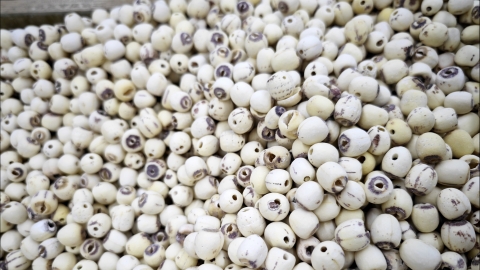What are the functions and benefits of lotus seed skin?
Generally, as the outer skin of the lotus seed, lotus seed husk has various functions and benefits, including astringing the intestines to stop diarrhea, consolidating the kidneys to reduce seminal emissions, promoting blood coagulation to stop bleeding, assisting in lowering blood lipids, and enhancing digestion. Detailed explanations are as follows:

1. Astringe the intestines and stop diarrhea: The lotus seed husk has an astringent taste, which provides a function of consolidation and retention. It can enhance the intestinal astringent function and help alleviate symptoms such as chronic diarrhea and dysentery. By reducing intestinal motility, it helps improve diarrhea conditions and is suitable for individuals suffering from diarrhea caused by intestinal dysfunction to consume in moderation.
2. Consolidate the kidneys and reduce seminal emissions: The astringent property of lotus seed husk can also affect the kidneys, helping to consolidate kidney function and reduce seminal emissions. It may assist in improving symptoms such as spermatorrhea and nocturnal emission caused by kidney deficiency. By retaining kidney essence, it helps maintain normal kidney function and is suitable for individuals with related symptoms to use appropriately.
3. Promote blood coagulation and stop bleeding: Lotus seed husk has a hemostatic effect through its astringent properties. It can help alleviate minor bleeding symptoms, such as rectal bleeding or menorrhagia. Its astringent characteristics help constrict blood vessels and reduce bleeding, thus assisting in relieving the discomfort caused by hemorrhage.
4. Assist in lowering blood lipids: Lotus seed husk contains dietary fiber and plant sterols, which can help inhibit the absorption of cholesterol in the intestines, thereby assisting in lowering blood lipid levels. It is suitable for individuals needing lipid regulation to consume in moderation.
5. Enhance digestion: The dietary fiber contained in lotus seed husk can promote intestinal peristalsis and increase fecal bulk, helping to improve constipation and support normal digestive function. Moderate consumption can help maintain a healthy intestinal condition.
When using lotus seed husk, it is also important to ensure it is thoroughly cleaned and consumed appropriately according to individual conditions to better exert its beneficial effects.





